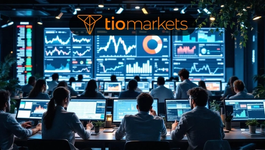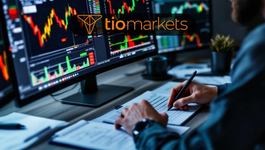World's Largest Stock Exchanges by Market Cap | TIOmarkets
BY TIOmarkets
|June 6, 2024Exploring the world's largest stock exchanges by market capitalization offers a fascinating glimpse into the global financial landscape. These powerhouses of finance not only provide a platform for buying and selling shares but also serve as barometers for the overall health of the world's economies. In this article, we delve into the intricacies of these financial behemoths, shedding light on their significance, operations, and the key players that dominate the market.
Understanding Market Capitalization
Before diving into the rankings, it's crucial to grasp what market capitalization means. Market capitalization, or market cap, is the total value of a company's outstanding shares of stock. It serves as a metric for the overall value of a company and by extension, the stock exchange where it is listed.
Calculating Market Cap
Market cap is calculated by multiplying the current share price by the total number of outstanding shares. This figure gives investors an idea of the company's size and, when aggregated for all companies listed on an exchange, the total market cap of the exchange itself.
Significance of Market Cap
Market cap is more than just a number. It reflects the market's perception of a company's future prospects and overall stability. Larger market cap companies are often considered more stable and less volatile than their smaller counterparts.
The Titans of Trade
The landscape of the world's largest stock exchanges is dominated by a few key players, each boasting trillions of dollars in total market capitalization. These exchanges are pivotal in the global financial system, facilitating the exchange of billions of dollars daily.
New York Stock Exchange (NYSE)
The NYSE stands as the largest stock exchange in the world, with a staggering market cap that surpasses other contenders. Located in the heart of New York City, it is home to some of the world's most prominent companies.
The NYSE is renowned for its rigorous listing requirements, ensuring that only companies of a certain stature make it onto the exchange. This has made it a symbol of corporate success and stability.
NASDAQ
Known for its tech-heavy listing, NASDAQ is the second-largest exchange by market cap. It is the preferred exchange for many of the world's leading technology companies, including giants like Apple, Amazon, and Google's parent company, Alphabet.
NASDAQ's electronic trading platform represents the modern face of stock trading, contrasting with the traditional trading floor of the NYSE.
Shanghai Stock Exchange (SSE)
As China's economy has grown, so too has the stature of its stock exchanges. The SSE is a testament to this growth, ranking as the third-largest exchange globally. It plays a crucial role in China's financial system and is a key platform for international investors looking to tap into the Chinese market.
The SSE lists many of China's largest companies and is characterized by its mix of state-owned enterprises and private companies.
Market Cap and Global Influence
The market cap of a stock exchange is a powerful indicator of its global influence. Exchanges with higher market caps are often seen as more influential, attracting a larger number of listings and offering greater liquidity.
Impact on Global Markets
These leading exchanges do not operate in isolation. Their fluctuations can have ripple effects across the global economy, influencing markets worldwide. They are closely watched by investors and analysts as indicators of economic health.
Role in Capital Formation
Stock exchanges play a critical role in capital formation, allowing companies to raise funds by issuing shares. This is vital for economic growth and innovation, providing companies with the capital needed to expand and innovate.
Looking Ahead
The landscape of the world's largest stock exchanges is constantly evolving. Technological advancements, regulatory changes, and shifts in the global economy all play a role in shaping the future of these financial institutions.
Technological Innovations
Technology is set to continue transforming the way stock exchanges operate, with electronic trading platforms and blockchain technology offering new possibilities for efficiency and transparency.
Emerging Markets
As emerging economies continue to grow, their stock exchanges are likely to rise in prominence. This could challenge the current hierarchy, introducing new dynamics into the global financial system.
In conclusion, the world's largest stock exchanges by market cap are more than just places for trading stocks. They are integral components of the global financial system, reflecting the economic might of the nations they represent and playing a pivotal role in the world economy. As we look to the future, these exchanges will undoubtedly continue to evolve, shaping and being shaped by the global economic landscape.
Market Cap and Investment Strategies
Investors often use market capitalization as a key factor in their investment strategies. Large-cap companies, with high market capitalization, are typically seen as more stable investments, offering lower risk compared to small-cap or mid-cap companies.
Large-cap companies are well-established firms with a proven track record of performance and stability. They are often considered safer investments during economic downturns due to their strong market positions and diversified revenue streams.
On the other hand, small-cap companies, with lower market capitalization, are perceived as higher risk but with the potential for higher returns. These companies are usually in the early stages of growth and may experience more significant price fluctuations.
Mid-cap companies fall between large-cap and small-cap companies in terms of market capitalization. They offer a balance of growth potential and stability, making them attractive to investors seeking a mix of risk and return.
Market Cap and Sector Analysis
Market capitalization can also be used to analyze different sectors within the stock market. By looking at the market cap of companies within a specific sector, investors can gain insights into the overall health and performance of that sector.
For example, technology companies often have high market capitalizations due to their innovative products and services. These companies drive growth and innovation in the market, making the technology sector a key player in the stock market.
On the other hand, utilities companies, which provide essential services like water and electricity, may have lower market capitalizations but offer stability and consistent dividends. Investors looking for defensive stocks often turn to the utilities sector for reliable income.
By analyzing market capitalization across different sectors, investors can diversify their portfolios and manage risk effectively by investing in a mix of high and low market cap companies.
Market Cap and Investment Styles
Investors often align their investment styles with specific market capitalization categories. Growth investors, for example, focus on companies with high growth potential, often found in the small-cap and mid-cap categories.
Value investors, on the other hand, seek out undervalued companies with strong fundamentals, typically found in the large-cap category. These investors look for companies trading below their intrinsic value, offering the potential for long-term gains as the market corrects its pricing.
By understanding market capitalization and its implications for investment strategies, investors can tailor their portfolios to align with their financial goals and risk tolerance.
Market Cap and Global Diversification
Market capitalization plays a crucial role in global diversification strategies for investors. By investing in companies of varying market caps across different regions, investors can spread risk and capture opportunities in diverse markets.
Large-cap companies in developed markets like the US and Europe offer stability and liquidity, while small-cap companies in emerging markets like India and Brazil provide growth potential. By diversifying across market capitalization categories and geographic regions, investors can build resilient portfolios that weather market fluctuations.
Challenges of Global Diversification
While global diversification offers benefits in terms of risk management and return potential, it also presents challenges for investors. Currency fluctuations, political instability, and regulatory differences can impact the performance of international investments.
Investors must conduct thorough research and due diligence when diversifying globally, taking into account factors like economic indicators, market trends, and geopolitical risks. By staying informed and adapting to changing market conditions, investors can navigate the complexities of global diversification successfully.
Market Cap and Portfolio Construction
Market capitalization is a fundamental consideration in portfolio construction, influencing asset allocation and risk management strategies. A well-diversified portfolio typically includes a mix of large-cap, mid-cap, and small-cap stocks to balance risk and return.
Large-cap stocks provide stability and dividend income, mid-cap stocks offer growth potential, and small-cap stocks present opportunities for high returns. By combining companies of varying market caps in a portfolio, investors can optimize risk-adjusted returns and achieve their investment objectives.
Portfolio Rebalancing and Market Cap
Portfolio rebalancing is essential to maintain the desired asset allocation and risk profile over time. As market conditions change, the relative weights of large-cap, mid-cap, and small-cap stocks in a portfolio may shift, requiring adjustments to realign with the investor's goals.
By regularly reviewing and rebalancing their portfolios based on market capitalization and performance, investors can stay on track to meet their financial objectives and adapt to changing market dynamics.
In conclusion, market capitalization is a key metric in the world of investing, shaping investment strategies, sector analysis, global diversification, and portfolio construction. Understanding the implications of market cap can empower investors to make informed decisions, build resilient portfolios, and navigate the complexities of the global financial markets.
Start Trading with TIOmarkets Today
Now that you understand the significance of market capitalization and its impact on the financial markets, take the next step with TIOmarkets. Join over 170,000 traders in 170 countries who have chosen our top-rated platform for trading Forex, indices, stocks, commodities, and futures. With low fees and access to over 300 instruments across 5 markets, we provide the tools you need to trade effectively. Enhance your skills with our educational resources and step-by-step guides. Ready to dive into the world of trading? Create a Trading Account with TIOmarkets and start your journey today.

Risk disclaimer: CFDs are complex instruments and come with a high risk of losing money rapidly due to leverage. You should consider whether you understand how CFDs work and whether you can afford to take the high risk of losing your money. Never deposit more than you are prepared to lose. Professional client’s losses can exceed their deposit. Please see our risk warning policy and seek independent professional advice if you do not fully understand. This information is not directed or intended for distribution to or use by residents of certain countries/jurisdictions including, but not limited to, USA & OFAC. The Company holds the right to alter the aforementioned list of countries at its own discretion.
Join us on social media

Behind every blog post lies the combined experience of the people working at TIOmarkets. We are a team of dedicated industry professionals and financial markets enthusiasts committed to providing you with trading education and financial markets commentary. Our goal is to help empower you with the knowledge you need to trade in the markets effectively.
Related Posts





